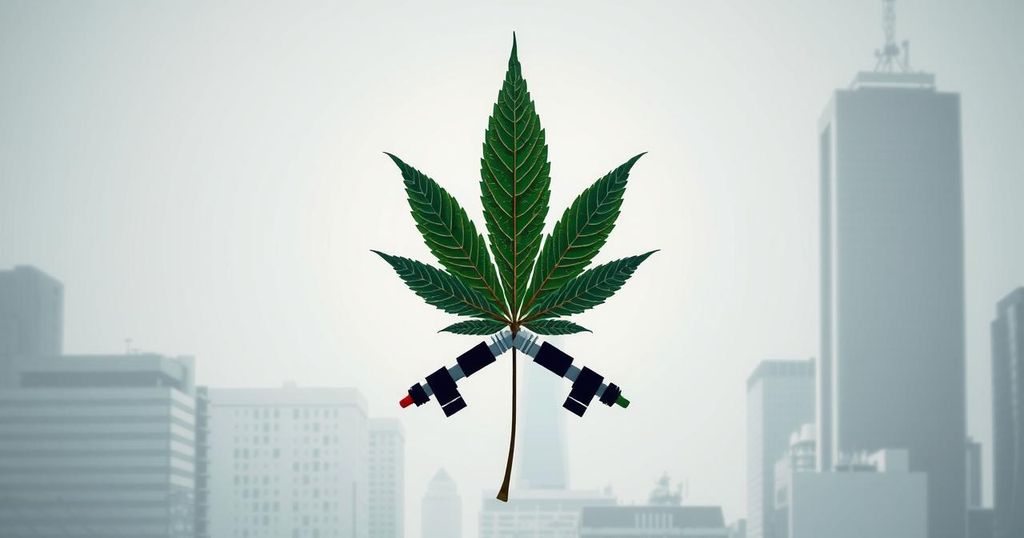Nigeria’s Ongoing Battle Against Drug Abuse and Trafficking
Nigeria is facing a severe drug crisis highlighted by the recent lynching of NDLEA officer Aliyu Imran, who died enforcing drug laws. The NDLEA has worked tirelessly to combat drug abuse and trafficking but must intensify its efforts. Arrests and drug seizures have increased significantly, revealing the magnitude of the issue. The government must enhance enforcement, raise awareness, and invest in technology to address the growing drug threats effectively among all demographics, including women.
Nigeria faces a significant challenge from drug-related issues, which can no longer be ignored. A recent tragedy in Gadan-Gayan, Kaduna State, underscores the deadly risks faced by operatives of the National Drug Law Enforcement Agency (NDLEA). Here, a newly married NDLEA officer, Aliyu Imran, was lynched by a mob while enforcing drug regulations, highlighting the need for comprehensive strategies to combat drug abuse and trafficking at all government levels.
NDLEA operatives have endured numerous fatalities in the line of duty since the agency’s inception in 1989. Officer Imran’s death, following a violent encounter with a suspected drug dealer, exemplifies the severe dangers faced by drug enforcement agents. The increasing hostility towards NDLEA officers, evidenced by multiple assaults and murders, demands urgent action from authorities.
Over the years, the NDLEA, under the leadership of Buba Marwa, has carried out several initiatives aimed at tackling drug abuse and trafficking. Operations have yielded significant drug seizures across the nation, and the agency has arrested and convicted thousands of drug traffickers. Despite these efforts, the prevalence of drug-related issues remains notably high, particularly in specific regions of Nigeria, which warrants further investigation and intervention.
Recent NDLEA reports indicate that drug abuse is most rampant in Nigeria’s South-West zone, with substantial activity also noted in the South-South and South-East areas. The agency’s statistics reveal that over 57,792 drug traffickers have been apprehended, including a notable number of drug barons. Drug seizures reached extraordinary volumes, surpassing 9.9 million kilograms over recent years, illustrating the magnitude of the drug crisis.
In 2024, the NDLEA continues to combat drug trafficking with impressive statistics, including the interception of 2.6 kilograms of hard drugs and the arrest of 18,500 offenders, of whom more than 3,000 have been convicted. Seizures from various operations demonstrated a staggering monetary value, emphasizing the scope of drug activities and reinforcing the need for ongoing vigilance and action.
The UN has identified drug abuse as a pressing public health issue that contributes to a cascade of societal problems, including addiction and violence. The rising incidents of drug-related activities prompt concerns about crises in health and safety, as Nigeria evolves into both a consumer and transit point for illicit substances. Action against the drug trade is essential to prevent further deterioration of the situation.
Despite enforcement efforts from agencies like the NDLEA, drug traffickers continue to adapt their tactics and devise new methods for distributing illicit substances. Drug use among school-age children is escalating, with harmful drugs marketed as innocuous items. It is vital for authorities to address these trends to protect the youth and society at large from the adverse effects of drug consumption.
According to various reports, narcotics trafficking in Nigeria is diverse, involving more than just cannabis and cocaine, with substances such as tramadol gaining prominence. The illicit drug trade, estimated globally at $360 billion, poses heightened risks to the country, categorized as a narco-state alongside Ghana and Guinea-Bissau. The NDLEA must intensify its efforts to address this critical crisis effectively.
Women account for a growing number of drug users, according to alarming statistics released by the National Drug Control Masterplan. Stigmatization surrounding drug abuse further complicates the issue, as drug problems among women often remain undetected until they escalate. Promoting awareness and access to treatment for all demographics is crucial in tackling the drug abuse epidemic in Nigeria.
The NDLEA’s recent initiatives have led to significant discoveries of meth laboratories and the destruction of illicit drug production sites. Collaboration with the judicial system is fundamental, ensuring that severe penalties are enforced against drug couriers and their patrons. The Nigerian government should further embrace technological advancements to support NDLEA’s relentless fight against drug trafficking and abuse.
The drug crisis in Nigeria demands urgent and robust action from all levels of government, as highlighted by the tragic killing of NDLEA officer Aliyu Imran. While the NDLEA has achieved notable successes, the ongoing threat of drug trafficking and abuse remains pervasive. Strengthening law enforcement efforts, increasing public awareness, and addressing the growing drug issue among women are critical steps. Coordinated actions and investments in technology will be essential in combating this dire situation effectively.
Original Source: punchng.com




Post Comment